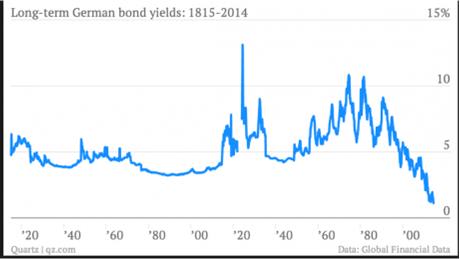また怒ってる(笑)。
ドイツもこけていたことが判明して「ざまーみろ」というより、ヨーロッパの疫病神たる一握りの人間への怒りが更に、という感じ。
…何かに似てると思ったら…そうか、ユーロ圏は上朝鮮と完全に一致(笑)!
Germany is itself a victim of EMU's austerity fanatics
(ドイツ自体がユーロ緊縮狂徒の被害者なのです)
By Ambrose Evans-Pritchard Economics
Telegraph Blog: Last updated: August 14th, 2014




ドイツもこけていたことが判明して「ざまーみろ」というより、ヨーロッパの疫病神たる一握りの人間への怒りが更に、という感じ。
…何かに似てると思ったら…そうか、ユーロ圏は上朝鮮と完全に一致(笑)!
Germany is itself a victim of EMU's austerity fanatics
(ドイツ自体がユーロ緊縮狂徒の被害者なのです)
By Ambrose Evans-Pritchard Economics
Telegraph Blog: Last updated: August 14th, 2014
So now we learn. Germany had a double-dip recession last year without telling us. This could soon turn into triple-dip after contraction of 0.2pc in the second quarter.
ってことでわかりましたね。
ドイツは去年、僕らには何も言わずに、二番底に落っこちていたのです。
第2四半期が-0.2%のマイナス成長だったからには、間もなく三番底でしょう。
German bond yields are pricing in stagnation as far as the eye can see. 10-year Bunds fell below 1pc this morning for the first time in history, and far below levels seen during the deflationary episodes of the Second Reich in the late 19th Century.
ドイツ国債の金利はどうやら不況を折り込んでます。
10年物の金利は今朝、史上初めて、1%を割りました。
19世紀終盤、第二帝国のデフレの時のレベルすら大きく下回っています。
The bond markets are flashing deflation warnings, but they are also indicting the European authorities for gross incompetence. Professor Paul De Grauwe from the London School of Economics says policy elites have misdiagnosed the fundamental cause of Europe's chronic slump and its failure to recover. They are treating a demand crisis as if it were a supply crisis, imposing "reforms" – an Orwellian touch – that can only exacerbate EMU-wide distress in the short-run.
債券市場はデフレ・ワーニングを点滅させていますが、それと同時に、欧州当局の甚だしい無能さも示唆しています。
ロンドン・スクール・オブ・エコノミクスのポール・デ・グラウェ教授に言わせると、政策エリートどもはヨーロッパの慢性的不況と回復失敗の根本原因を勘違いしているそうですよ。
彼らは需要危機をまるで供給危機のように扱って、ユーロ全域に広がる苦境を短時間で悪化させるだけの「改革」を押し付けたわけです(オーウェルっぽい感じ)。
"They are doing everything they can to stop recovery taking off, so they should not be surprised if there is in fact no take-off," he said.
「景気回復が波に乗らないように手を尽くしてるんだから、乗らなくたってほんとはちっとも驚きゃしないさ」
"It is balanced-budget fundamentalism, and it has become religious. We know from the 1930s that if everybody is trying to pay off debt and the government then deleverages at the same time, the result is a downward spiral," he said.
「財政均衡原理主義だ。宗教になっちゃったんだよ。1930年代からわかってんじゃん。猫も杓子も借金を返そうとして、ついでに政府まで一緒になって借金を返せば、その結果は悪循環さ」
"The rigidities in the European economy have been there for ages. They have absolutely nothing to do with the problem we face today."
「欧州経済なんて昔からガチガチじゃん。今目の前にある問題への対策は全く何にもしてないんだよ」
The claim that Spain's recovery validates the EMU strategy of retrenchment and reform makes you want to weep. To the extent that Spain has reached self-sustaining take-off – questionable given the collapse of investment and the damage from labour hysteresis – it is largely because Spain is pursuing a beggar-thy-neighbour wage squeeze policy, just as Germany did nine years ago with such malign effects for the eurozone as a whole.
スペインの景気回復がユーロの緊縮&改革戦略の正しさを証明している!とか…泣きたくなりますよ。
スペインが持続可能な景気回復の波に乗ったって主張(投資激減と労働ヒステリシスのダメージを考えたら怪しいもんですが)って、スペインが賃金引き下げ政策で近隣窮乏政策を推し進めたおかげでしょ。
9年前にドイツがやってユーロ圏全体にあれほど酷い悪影響を与えたみたいに。
This displaces the contractionary pressures into France and Italy. "You can do this in one country but it can't possibly be a model for the whole eurozone. If everybody does this it leads to generalised deflation, and that is what we are seeing," he said.
これで景気後退パワーはフランスとイタリアに向かうわけです。
「一か国なら出来るだろうけど、ユーロ圏全体のお手本には出来んわな。猫も杓子もやり出したらデフレが一般化する…ってホントにそうなってるし」
The outcome of Europe's strategic incoherence is that EMU output is still 2.5pc below its 2008 peak. This six-year slump is worse than Europe's performance the early 1930s by a wide margin. It is the most serious European depression seen in peacetime for 170 years, and I would wager that the 1840s were better.
ヨーロッパの無茶苦茶な戦略の結果、ユーロの生産は未だに2008年のピークを2.5%下回っています。
この6年間の不況は、1930年代初頭のヨーロッパのパフォーマンスよりも下回って、というか大いに下回っています。
170年ぶり平時最悪の欧州不況ですよ。
僕は1840年代と比べてもまだそっちの方がマシだと断言しますよ。
By contrast, US output is nearly 8pc above its old peak. America has achieved escape velocity. It is growing at a sustained rate that is 2pc to 3pc faster than in the eurozone. The compound effects of this are devastating. Europe is falling off the economic map.
対称的に、米国の生産はピークを8%近く上回っています。
米国は脱出速度に達しました。
ユーロ圏を2-3%上回る持続的スピードで成長しています。
これが積もり積もった影響は物凄いものです。
ヨーロッパは経済マップから外れつつあります。
While growth is allowing the US to reduce its aggregate debt ratio, slump is causing Europe's ratios to ratchet higher. There is no reward for hair-shirt policies. Calvinism is best kept in the Presbystery.
成長で米国は債務比率を下げています。
一方、ヨーロッパの債務比率を急激に上昇させています。
質素倹約政策にご褒美はありません。
カルヴァン主義なんか教会の中だけにするのが一番ですよ。
Europe's relapse is entirely self-inflicted. It is the result of policy failure by the European Central Bank, by the European Commission, by the Eurogroup (much of it under Jean-Claude Juncker), and above all by the German finance ministry, the body that is ultimately responsible for EMU crisis strategy.
ヨーロッパの衰退は全く自業自得です。
ECBと欧州委員会とユーログループ(殆どユンケル時代)、そして誰よりも何よりもユーロ危機戦略のA級戦犯、ドイツ財務省の政策ミスの結果だから。
The revised figures this morning from Wiesbaden (Destastis) show that the German economy has been far weaker than originally supposed. GDP contracted by 0.4pc in Q4 2012, and again in Q1 2013. Average growth over the last two years has been little more that 0.6pc.
今朝、ドイツ統計局が出した修正データは、ドイツ経済が当初思われてたよりも遥かにヘロヘロだってことを見せつけましたね。
GDPは2012年第4四半期に-0.4%、2013年第1四半期にも-0.4%縮小してました。
過去2年間の平均成長率はたったの0.6%強だって。
Germany is the victim of its own policy of pro-cyclical fiscal austerity and its refusal to invest. It is gaining nothing from a current account surplus of 7.5pc of GDP (in breach of EU limits). The secondary effects on other countries are so damaging that they more than negate any gain for Germany itself.
ドイツは、景気循環増幅的な緊縮財政はやるけど投資は断る、っていう自分の政策で自爆してるんですね。
GDPの7.5%もの経常黒字だって何の役にも立ってないし(しかもEUの黒字上限違反だし)。
他の国へのとばっちりも猛毒過ぎて、ドイツ自体への利益なんか吹き飛んでお釣りがくるくらい。
The eurozone as a whole has stalled to zero growth. It has no safety margin as the effect of Russian sanctions start to bite, lopping 0.3pc off Europe's GDP this year (according to a leaked document by the Commission). It has no margin against a potential credit shock from China, nor against knock-on effects from Fed tightening in the US.
ユーロ圏全体だとゼロ成長率になりました。
対ロ制裁が本格化して影響があっても、てか今年はヨーロッパのGDPを0.3%も削ぐわけですが(ソースは欧州委員会からリークした文書)、そうなっても安全バッファーなんてないんですね。
中国からの潜在的信用ショックへのクッションもなければ、米FRBの引き上げドミノ倒しへの支えもないと。
The ECB is paralysed by politics. It cannot secure German assent for quantitative easing because Berlin/Buba are using stimulus as an instrument to enforce their reform dictates, and they are not yet satisfied that Italy is complying. Monetary policy has been contaminated.
ECBは政治でがんじがらめです。
ドイツからQE承認を獲得出来ないんですね。
ってのも、ドイツ政府/ブンデスバンクは自分達が押し付ける改革を推し進めるための道具として刺激を利用してるから。
しかも未だイタリアが言いつけに従っていると思ってないし。
金融政策は汚染されてしまったのです。
Those in charge are so stubborn, ideological, and certain of their cause, that they are willing to drive Europe over the edge to force obeisance. They are doing so even though credit is still contracting, the M3 money supply has ground to a halt, a third of the eurozone is in outright deflation, and now Germany itself has buckled. Policy is too tight even for Germany itself. Yet it goes on, because otherwise Latins might get off too lightly.
ハンドルを握る連中が余りにも頑固で、観念的で、自分達の大義に確信を持っちゃってるがために、無条件降伏させるためならヨーロッパを崖っぷちから突き落とすことも辞さないわけです。
この連中は信用が減り続けているのに、M3マネーサプライの伸びが完全停止してるのに、ユーロ圏の3分の1がデフレ真っ只中なのに、今やドイツ自体もこけたのに、それでもそんなことをやってるんですね。
政策はドイツにすら厳し過ぎるんですよ。
それでもいけいけですよ。
だって、そうしなけりゃ、ラテン陣営へのお仕置きが足りなくなっちゃう。
If you want a good target for "structural reform" – the mantra that grates, the more it is repeated – you might start with institutional governance of the eurozone itself. That certainly cries out for a neutron bomb.
「構造改革」(繰り返されるほどにイザコザ悪化の呪文ですな)の良き標的がほしいなら、ユーロ圏のガバナンスから始めたらいかがですか。
それなら超大構造改革が確実に必要ですよ。
Since we all know that EMU politics are intractably hopeless, we can only conclude that Europe will lurch from debacle to debacle until the Project is shut down for the good of humanity.
ユーロ政治はどうにもならないほど絶望的、ってことを僕らは皆知ってますから、人類の明るい未来のためにユーロ・プロジェクトが潰されるまで、ヨーロッパは危機から危機へと渡り歩くことになるという結論に行き着くだけです。
Thank you. Now I will take my medicine.
ご精読ありがとうございました。
僕はお薬の時間です。














